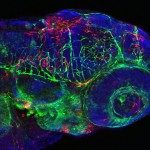Link to Pubmed [PMID] – 22167186
J. Biol. Chem. 2012 Feb;287(6):4232-47
Bin/Amphiphysin/Rvs (BAR) domain-containing proteins are essential players in the dynamics of intracellular compartments. The BAR domain is an evolutionarily conserved dimeric module characterized by a crescent-shaped structure whose intrinsic curvature, flexibility, and ability to assemble into highly ordered oligomers contribute to inducing the curvature of target membranes. Endophilins, diverging into A and B subgroups, are BAR and SH3 domain-containing proteins. They exert activities in membrane dynamic processes such as endocytosis, autophagy, mitochondrial dynamics, and permeabilization during apoptosis. Here, we report on the involvement of the third α-helix of the endophilin A BAR sequence in dimerization and identify leucine 215 as a key residue within a network of hydrophobic interactions stabilizing the entire BAR dimer interface. With the combination of N-terminal truncation retaining the high dimerization capacity of the third α-helices of endophilin A and leucine 215 substitution by aspartate (L215D), we demonstrate the essential role of BAR sequence-mediated dimerization on SH3 domain partnership. In comparison with wild type, full-length endophilin A2 heterodimers with one protomer bearing the L215D substitution exhibit very significant changes in membrane binding and shaping activities as well as a dramatic decrease of SH3 domain partnership. This suggests that subtle changes in the conformation and/or rigidity of the BAR domain impact both the control of membrane curvature and downstream binding to effectors. Finally, we show that expression, in mammalian cells, of endophilin A2 bearing the L215D substitution impairs the endocytic recycling of transferrin receptors.

